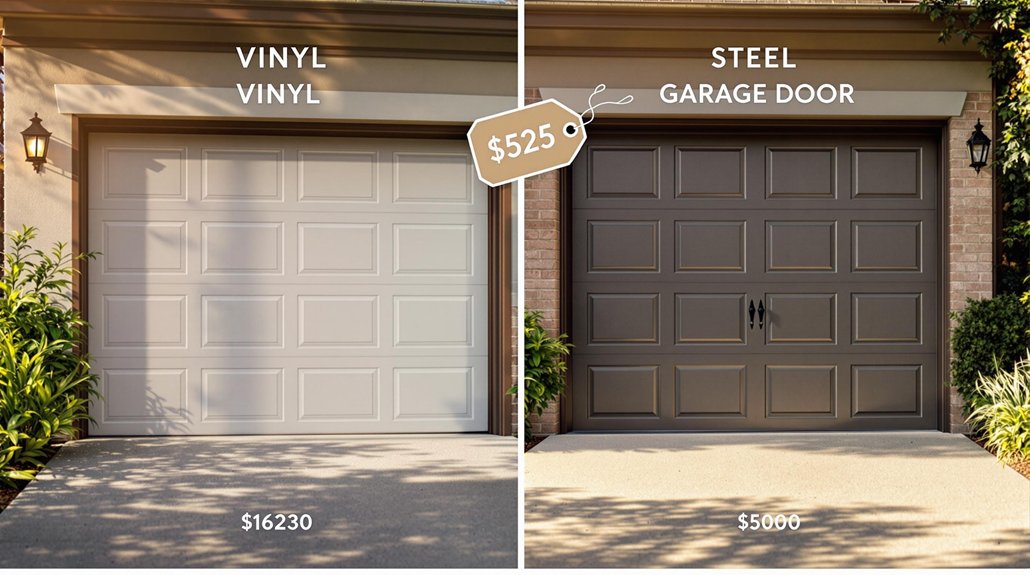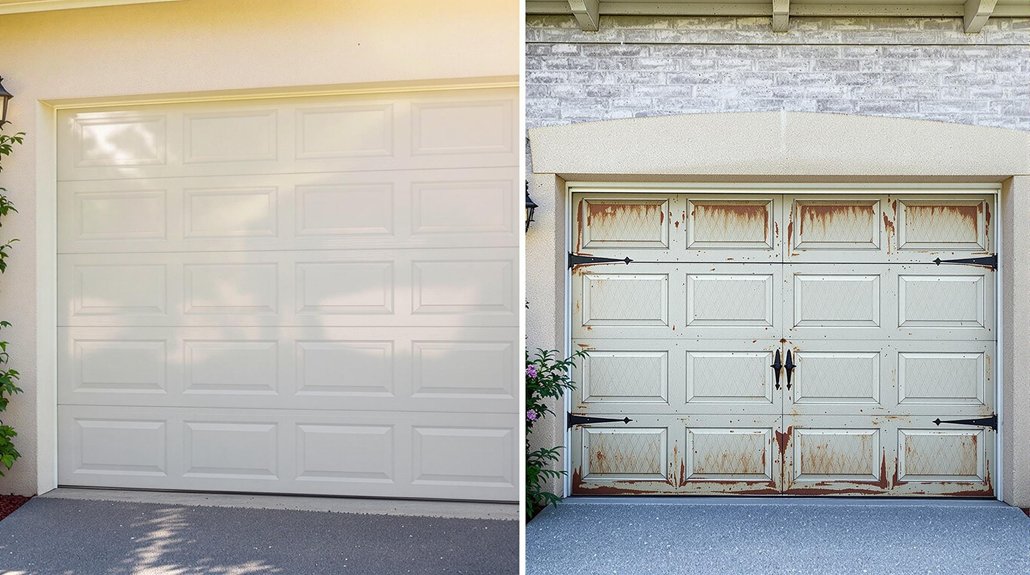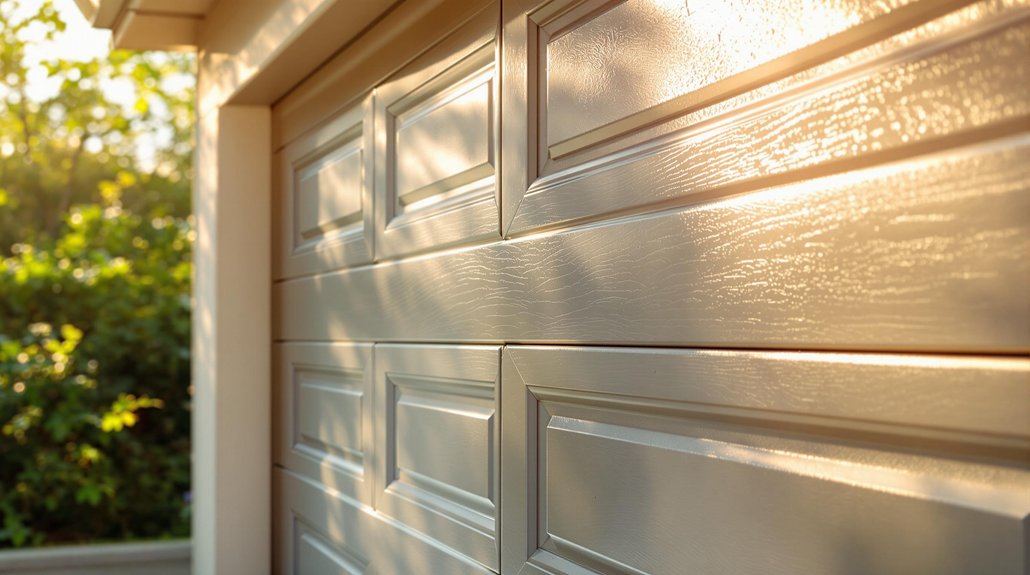Vinyl garage doors are typically more expensive than steel doors at the initial purchase stage. This higher cost is due to the quality of materials and the manufacturing process involved. Though steel doors are more cost-effective upfront, they may incur additional maintenance costs over time. Vinyl doors require less upkeep, providing long-term savings in maintenance. Additionally, vinyl doors often offer better energy efficiency. When choosing between these options, it is essential to weigh the initial price against long-term value and expenses. Exploring these factors further can help you make an informed decision about your garage door choice.
Key Article Highlights
- Vinyl garage doors typically have a higher initial purchase price due to their manufacturing and material quality compared to steel options.
- While vinyl doors may cost more upfront, they offer lower maintenance requirements, leading to potential long-term savings.
- Steel garage doors are generally less expensive initially, but may incur higher long-term repair costs.
- Installation of vinyl doors may require specialized techniques, increasing overall expenses beyond the initial purchase price.
- Evaluating total cost of ownership, including maintenance and energy efficiency, is essential when comparing vinyl and steel garage doors.
Overview of Garage Door Materials
When choosing a garage door, understanding the different materials available is essential. Garage door types vary mainly by the materials used: vinyl, steel, wood, and fiberglass. Each material offers unique advantages that can affect your decision.
Vinyl garage doors are known for their resistance to dents and rust. They require less maintenance and can withstand harsh weather conditions. This durability makes them a popular choice among homeowners. On the other hand, steel garage doors are strong and secure. They can be insulated for energy efficiency, making them a practical option for colder climates.
Wood garage doors provide a classic aesthetic but need more upkeep to prevent decay and warping. Fiberglass doors are lightweight and can mimic the appearance of wood while resisting weather damage.
When evaluating material advantages, consider factors such as durability, maintenance, and insulation. Each garage door type has its pros and cons, so it is vital to assess your specific needs and preferences. Understanding these materials will guide you in selecting the best garage door for your home.
Cost Comparison of Vinyl and Steel
Cost is an important factor to evaluate when selecting between vinyl and steel garage doors. A thorough cost analysis reveals that vinyl doors generally have a higher initial purchase price compared to steel doors. This difference is often due to the manufacturing process and material quality. However, it is essential to take into account long-term costs as well.
When examining market trends, steel doors may be more cost-effective regarding maintenance and durability. Steel is known for its strength and resistance to damage, which can lead to fewer repairs over time. In contrast, vinyl doors can fade or become brittle with age, possibly resulting in increased replacement costs.
Additionally, installation costs can vary between the two materials. Vinyl doors may require specialized installation techniques, which can add to the overall expense. In contrast, steel doors often have a more straightforward installation process, potentially reducing labor costs.
Ultimately, the total cost of ownership for each garage door type should be assessed. Homeowners should evaluate both the upfront and long-term costs to make an informed decision that aligns with their budget and preferences.
Factors Influencing Garage Door Prices

The price of garage doors can vary greatly based on several factors. Material composition plays a key role, as different materials have different costs and durability. Additionally, installation and maintenance costs can impact the overall price, making it important to take into account these elements when choosing a garage door.
Material Composition Impact
Material composition plays an essential role in determining the price of garage doors. Different materials, such as vinyl and steel, come with various material benefits and cost implications. Vinyl garage doors are often lighter and can resist dents better than steel. This durability can lead to lower maintenance costs over time. However, the initial price of vinyl doors tends to be higher due to the manufacturing process and the materials used.
On the other hand, steel garage doors are typically less expensive upfront. They offer good security and strength but may be prone to rust and dents. This vulnerability can increase long-term costs if repairs or replacements are needed.
Additionally, insulation and other features can affect pricing. Insulated steel doors may be priced similarly to vinyl doors due to their enhanced energy efficiency. Ultimately, the choice between vinyl and steel should consider both the material benefits and the long-term cost implications. Understanding these factors helps homeowners make informed decisions that align with their budget and needs. Selecting the right material can lead to significant savings and satisfaction over the lifespan of the garage door.
Installation and Maintenance Costs
Installation and maintenance expenses are crucial factors that influence the overall price of garage doors. Different materials, such as vinyl and steel, have unique installation techniques that affect costs. Vinyl garage doors often require specialized installation methods due to their lightweight structure. In contrast, steel doors may need additional reinforcement, increasing labor costs.
Maintenance frequency also plays a significant role in the long-term costs associated with garage doors. Vinyl doors typically require less upkeep than steel doors, which may need regular painting or rust prevention. This can affect the total cost over time.
Here's a simple comparison of installation and maintenance costs for vinyl and steel garage doors:
| Type of Door | Installation Cost | Maintenance Frequency |
|---|---|---|
| Vinyl | Moderate | Low |
| Steel | High | Moderate to High |
| Overall Cost | Lower | Higher over time |
Understanding these factors helps homeowners choose the right garage door for their needs. By considering installation techniques and maintenance frequency, buyers can make informed decisions that fit their budgets and lifestyles.
Durability of Vinyl vs. Steel
While both vinyl and steel garage doors offer distinct advantages, their durability can vary considerably. Vinyl doors are known for their impressive vinyl longevity. They resist rust and corrosion, making them suitable for various weather conditions. However, they can be susceptible to dents and scratches, which may affect their appearance and overall durability over time.
On the other hand, steel doors are recognized for their steel strength. They are robust and can withstand significant impacts. Steel doors are less likely to suffer from physical damage compared to vinyl. However, they can rust if not properly maintained, particularly in areas with harsh climates.
Maintenance Requirements for Each Material

When comparing vinyl and steel garage doors, maintenance requirements play a key role. Each material has different needs for cleaning, care, and durability over time. Additionally, weather resistance factors can impact how often maintenance is needed.
Durability Over Time
Understanding the long-term durability of vinyl and steel garage doors involves examining their maintenance requirements. Both materials have different longevity factors that impact their overall lifespan. Vinyl doors tend to resist fading and are less likely to dent, contributing to their durability. They require minimal maintenance, mainly occasional cleaning.
In contrast, steel garage doors offer high impact resistance. However, they may need more care to prevent rust and scratches. Regular inspections and touch-ups are essential to maintain their appearance and functionality over time.
The table below summarizes the maintenance requirements for each material:
| Material | Maintenance Requirements |
|---|---|
| Vinyl | Minimal; clean occasionally |
| Steel | Regular inspections; rust prevention |
Cleaning and Care
Cleaning and care are essential for maintaining the appearance and functionality of both vinyl and steel garage doors. Each material has specific maintenance needs that should be followed.
For vinyl garage doors, it is important to use gentle cleaning techniques. A simple mixture of mild soap and water can effectively remove dirt and grime. Use a soft cloth or sponge to avoid scratching the surface. Rinsing with clean water will help prevent soap residue.
Steel garage doors require different care tips. They should be inspected regularly for signs of rust or scratches. If any are found, sand the area lightly and apply touch-up paint. Regular washing with soap and water is also recommended to remove dirt.
Both materials benefit from occasional waxing to enhance their appearance and protect the surface. Additionally, checking seals and hardware for wear can prevent larger issues.
Weather Resistance Factors
Evaluating weather resistance is essential for determining the long-term performance of garage doors. Both vinyl and steel doors offer unique benefits and challenges when it comes to adapting to different climates. Understanding their maintenance requirements can help homeowners make informed choices.
Here is a summary of the weather resistance factors for both materials:
| Material | Weather Resistance | Maintenance Requirement |
|---|---|---|
| Vinyl | High; resists moisture and does not rust | Minimal; occasional cleaning needed |
| Steel | Moderate; prone to rust without proper treatment | Frequent; requires protective coating and inspection |
Vinyl garage doors excel in moisture resistance, making them suitable for humid climates. They require minimal upkeep, only needing occasional cleaning. On the other hand, steel doors can be more susceptible to rust, especially in wet conditions. They need regular maintenance, such as applying protective coatings to enhance their weather resistance.
Aesthetic Options and Customization
When it comes to aesthetic options and customization, both vinyl and steel garage doors offer distinct advantages. Vinyl doors provide excellent design flexibility. They can be molded into various shapes and styles, allowing homeowners to achieve a unique look. This flexibility is appealing for those wanting a personalized touch. Additionally, vinyl garage doors come in an array of color options. Homeowners can choose shades that complement their home's exterior, enhancing curb appeal.
On the other hand, steel garage doors also have significant aesthetic benefits. They are available in numerous designs, including traditional and modern styles. Steel doors can be painted in different colors, and the finish can be customized to suit personal preferences. Some homeowners may even opt for decorative hardware to enhance the overall appearance.
Both materials can mimic the look of wood, providing an attractive option without the maintenance concerns of real wood. Ultimately, the choice between vinyl and steel may come down to personal taste. Each material offers unique features that can fulfill the aesthetic desires of homeowners, while also fitting into various architectural styles.
Energy Efficiency Considerations

Aesthetic appeal is important, but homeowners should also consider energy efficiency when choosing between vinyl and steel garage doors. Both materials offer different energy efficiency benefits that can impact your home's overall energy consumption. Vinyl garage doors often come with higher insulation ratings compared to their steel counterparts. This means they can help keep your garage warmer in winter and cooler in summer.
The insulation ratings of garage doors are vital for maintaining a consistent indoor temperature. A well-insulated door reduces the amount of heat loss during colder months, leading to lower heating costs. Similarly, it can minimize heat gain in the summer, which aids in cooling efficiency. This can be particularly beneficial if your garage is attached to your home.
Steel doors can also provide decent insulation, but they might not match the energy efficiency benefits of vinyl doors. Homeowners should check the specific insulation ratings of each option to make an informed decision. To summarize, considering energy efficiency is essential when selecting a garage door, as it can influence both comfort and energy savings over time.
Long-Term Value and Investment
Choosing the right garage door is not just a matter of immediate cost; it also affects long-term value and investment. Vinyl and steel garage doors each have their own benefits that can impact your finances over time. Vinyl doors tend to require less maintenance than steel doors, which can lead to long term savings. This reduced need for repairs or replacements can result in a more favorable cost over time.
Additionally, the material you choose can influence your home's resale value. Many buyers appreciate the aesthetic appeal and durability of vinyl doors. This preference can enhance the overall value of your property. In contrast, while steel doors can be sturdy, they may not provide the same visual appeal or energy efficiency as vinyl.
When considering long-term value, think about the lifespan and performance of each option. Investing in a vinyl garage door may yield better returns in the future due to its low maintenance needs and potential to attract buyers. Ultimately, weighing the cost against long term savings and resale value is significant in making an informed decision.
Frequently Asked Questions
Can Vinyl Garage Doors Be Painted or Stained?
Ironically, vinyl garage doors, often praised for their low maintenance, can't be painted or stained. Homeowners seeking diverse color options should consider this limitation when selecting materials for their garage door aesthetics.
How Do Climate Conditions Affect Vinyl Garage Doors?
Climate conditions considerably impact vinyl garage doors, particularly regarding insulation properties and temperature resistance. Extreme temperatures can cause warping or cracking, while fluctuations in humidity may affect their overall durability and performance over time.
Are Vinyl Garage Doors Recyclable at the End of Their Lifespan?
Vinyl garage doors, while not as ubiquitous as air, are indeed recyclable at the end of their lifespan. Engaging in vinyl recycling considerably reduces environmental impact, promoting sustainability and responsible waste management practices in construction materials.
What Is the Average Lifespan of a Vinyl Garage Door?
The average lifespan of a vinyl garage door is approximately 20 to 30 years. Proper maintenance costs and following installation tips can greatly enhance durability, ensuring peak performance throughout its intended lifespan.
Do Vinyl Garage Doors Come With Warranties, and What Do They Cover?
Ironically, while vinyl garage doors may seem like a low-cost option, they typically come with warranty coverage that lasts between five to ten years, covering defects and fading, ensuring peace of mind for homeowners.